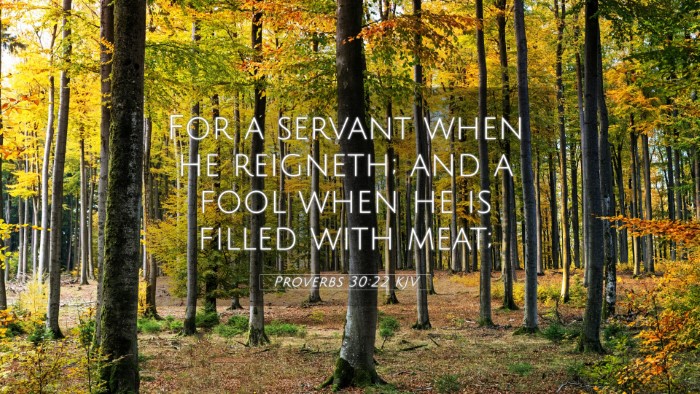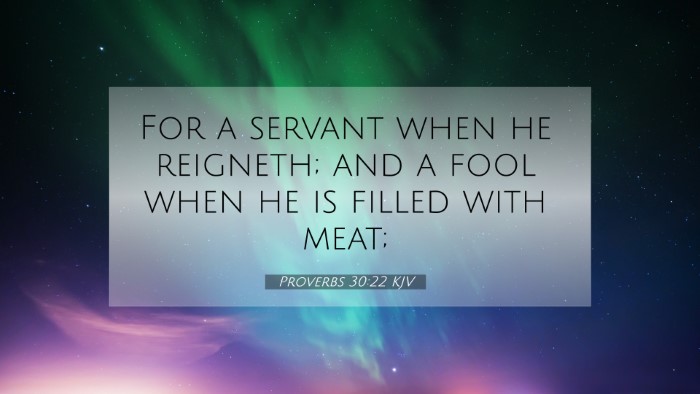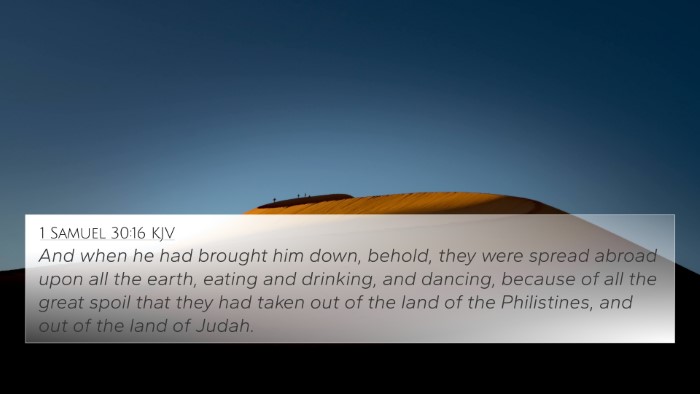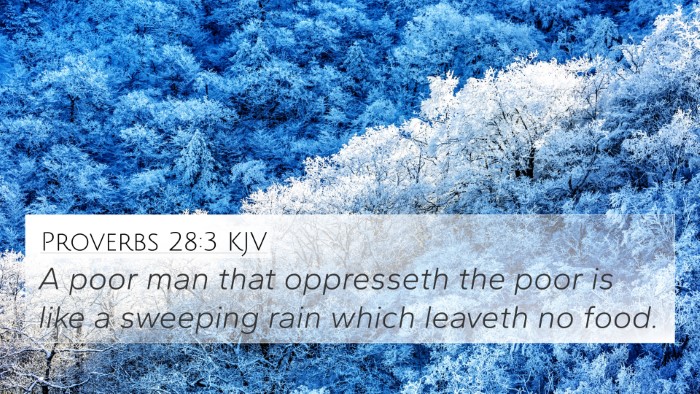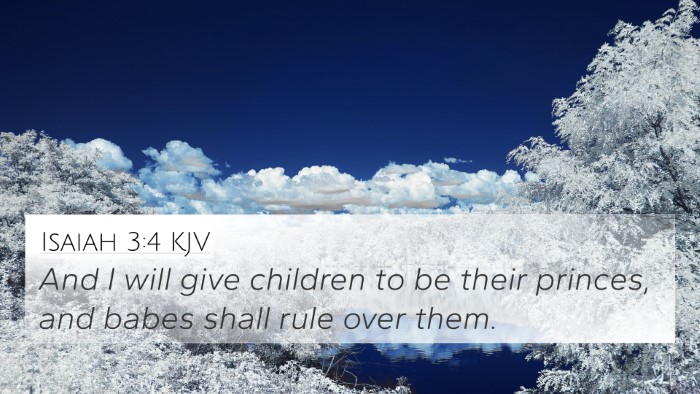Understanding Proverbs 30:22
Proverbs 30:22 states: "For a servant when he reigneth; and a fool when he is filled with meat." This verse, drawn from the wisdom literature of the Bible, contains profound implications regarding the characteristics and behavior of individuals based on their status.
Meaning and Interpretation
In exploring the meaning of Proverbs 30:22, we can draw insights from esteemed historical commentaries by Matthew Henry, Albert Barnes, and Adam Clarke. This combined analysis provides a nuanced perspective on the themes of servanthood, wisdom, and the nature of foolishness.
Matthew Henry's Commentary
Matthew Henry emphasizes the contrasting states of a servant and a fool. He interprets the reign of a servant as a sign of instability, suggesting that those who are not fit for leadership may find themselves in positions of authority, leading to chaos and division. This represents a societal inversion, where roles are dangerously flipped.
Albert Barnes's Commentary
Albert Barnes focuses on the folly associated with abundance, highlighting that a fool, when he has his needs met, may exhibit behaviors that reveal poor judgment. Barnes points out that satisfaction can often lead to complacency, and those who lack wisdom may act irresponsibly when granted worldly goods or power.
Adam Clarke's Commentary
Adam Clarke elaborates on the concept of a servant reigning, stating that it illustrates the disorder that comes from unqualified individuals taking charge. Clarke draws a parallel between the golden rule of humility in leadership and the perilous outcomes when those unprepared for authority assume roles that they are ill-equipped to handle.
Key Themes in Proverbs 30:22
- Disparity in Roles: This verse raises questions about qualifications for leadership and the dangers of societal role reversals.
- Folly in Prosperity: It cautions against the foolish behavior that may arise when individuals find themselves in abundance or filled with material goods without the accompanying wisdom.
- The Nature of Leadership: It emphasizes the importance of preparedness and wisdom in those who lead, drawing attention to the perils of unchecked authority.
Cross-References
To deepen the understanding of Proverbs 30:22, we can cross-reference it with several Biblical texts that reflect on similar themes:
- Proverbs 12:24: "The hand of the diligent will rule, while the lazy will be put to forced labor." - Reflects the value of diligence and preparedness.
- Ecclesiastes 10:16: "Woe to you, O land, when your king is a child, and your princes feast in the morning!" - A cautionary note about immature leadership.
- Proverbs 26:1: "Like snow in summer and rain in harvest, so honor is not fitting for a fool." - Highlights the inappropriateness of giving honor to those without wisdom.
- Matthew 20:26-27: "Whoever wants to become great among you must be your servant." - Contrasts true leadership with the folly described in Proverbs 30:22.
- Lamentations 5:8: "Servants rule over us; there is none to deliver us out of their hand." - Another reflection on the condition of servitude in leadership roles.
- 1 Corinthians 1:27: "But God chose the foolish things of the world to shame the wise..." - Indicates a reversal that can lead to unexpected outcomes.
- Luke 16:10: "Whoever can be trusted with very little can also be trusted with much..." - Speaks to the importance of faithfulness in smaller responsibilities before being entrusted with more significant ones.
Practical Applications
Reflecting on the implications of Proverbs 30:22, one may consider how these concepts apply in various life scenarios:
- Leading with Wisdom: Individuals in positions of authority must recognize their need for wisdom and humility to serve effectively.
- Recognizing Complacency: In times of abundance, it is essential to remain vigilant against the complacency that can lead to foolish actions.
- Striving for Integrity: The call for integrity in leadership encourages the pursuit of qualifications and the right intentions.
Concluding Thoughts
Proverbs 30:22 serves as a somber reminder of the essential qualities valued in both servanthood and leadership. As we engage in comparative Bible verse analysis and cross-referencing Biblical texts, this verse prompts us to examine the interplay of wisdom, societal roles, and the nature of foolishness. In seeking to understand the connections between Bible verses, we can apply these lessons in ways that enrich our lives and enhance our understanding of God’s word.
Your Bible Study Journey
As you embark on your Bible study journey, consider utilizing tools for Bible cross-referencing to uncover deeper meanings and connections. Explore how various scriptures converge around similar themes, and revise your approach to understanding scripture using a robust Bible cross-reference guide.
By doing so, you will not only increase your knowledge but also develop a more profound appreciation for the intricate web of teachings found within the pages of the Bible.

